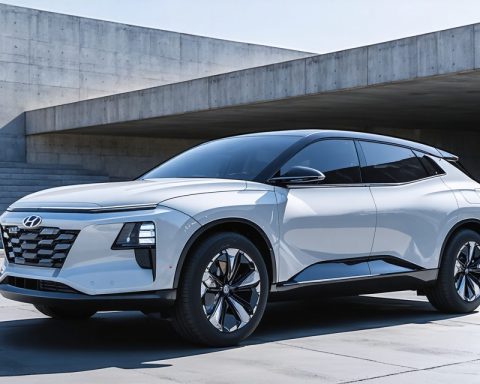- Hydrogen Mem-Tech is revolutionizing the ammonia value chain with its innovative membrane technology, playing a pivotal role in the global energy transition.
- Ammonia holds promise as a carbon-free fuel and a crucial component in fertilizers, key to advancing a sustainable energy landscape.
- The company’s technology aims to enhance ammonia production efficiency, reduce emissions, and promote sustainability in industrial processes.
- In a recent webinar, Hydrogen Mem-Tech highlighted its efforts as part of a larger movement towards environmental stewardship and cleaner energy solutions.
- The narrative emphasizes the critical role of innovation in the pursuit of a sustainable future, positioning Hydrogen Mem-Tech as a leader in energy transformation.
- As sustainability becomes a global imperative, the work of companies like Hydrogen Mem-Tech signals the beginning of significant change and progress.
Amid the swirling currents of the global energy transition, an intriguing narrative unfolds at Hydrogen Mem-Tech, where technology meets innovation. This trailblazing company is reshaping the ammonia value chain with a visionary approach and is a key player in the unfolding energy revolution.
Imagine ammonia, a compound pivotal for its potential as a carbon-free fuel and as a cornerstone of fertilizers, paving the way to a greener tomorrow. At the heart of this transformation lies Hydrogen Mem-Tech’s groundbreaking membrane technology. This innovation promises to amplify ammonia’s role in the sustainable energy landscape, offering a more efficient, cleaner method of production.
In the virtual halls of a recent webinar, Hydrogen Mem-Tech’s leadership painted a vivid picture of the future. Smoothly navigating the complexities of the ammonia market, they detailed how their technology could significantly reduce emissions, pivot industrial processes towards sustainability, and redefine what’s possible in the energy world. This dialogue captures a fascinating intersection of science and environmental stewardship.
The vibrant discussion underscored a crucial message: As the world accelerates its shift towards sustainability, companies like Hydrogen Mem-Tech are not just participants; they are architects of change. Their work is emblematic of a broader movement pushing the boundaries of what’s conceivable in the pursuit of a cleaner planet.
For those captivated by the potential of ammonia and its role in the future of energy, this emerging story provides both hope and a call to action. As we stride towards a more sustainable future, the importance of innovation cannot be overstated. Keep an eye on the horizon—change is not coming; it’s already here.
The Future of Clean Energy: How Ammonia and Hydrogen Mem-Tech’s Innovations Are Leading the Charge
How-To Steps & Life Hacks: Harnessing the Power of Ammonia for Sustainable Energy
1. Understand the Basics: Familiarize yourself with the properties of ammonia — a compound composed of nitrogen and hydrogen — and its role in both fertilizers and as a potential carbon-free fuel.
2. Stay Informed: Attend webinars and read literature from companies like Hydrogen Mem-Tech to stay updated on technological advancements.
3. Implement Sustainability Practices: If you’re involved in industrial processes, consider integrating membrane technology to reduce emissions and improve efficiency.
4. Advocate for Change: Support policies and initiatives that promote renewable energy sources and innovation in sustainable technology.
Real-World Use Cases: Ammonia’s Role in Transforming Industries
– Agriculture: Ammonia remains critical in fertilizers, making farming practices more efficient and potentially reducing greenhouse gas emissions.
– Transportation: Research is underway to use ammonia as a hydrogen carrier for fuel cells, offering a greener alternative to fossil fuels.
– Energy Storage: Ammonia can be used as an energy storage medium due to its high energy density, enabling renewable energy integration.
Market Forecasts & Industry Trends
According to a report by Grand View Research, the global ammonia market is anticipated to grow at a compound annual growth rate (CAGR) of 5.59% from 2021 to 2028. Companies like Hydrogen Mem-Tech are driving this growth with innovations that promise cleaner production methods.
Reviews & Comparisons
Compared to traditional Haber-Bosch production methods, Hydrogen Mem-Tech’s membrane technology offers higher energy efficiency and reduced carbon emissions. This positions it favorably against conventional processes, making it a pivotal player in the ammonia value chain.
Controversies & Limitations
– Environmental Concerns: The production of ammonia can still involve CO2 emissions. However, innovations in membrane technology are working to minimize this impact.
– Economic Viability: The initial costs of adopting new technologies can be high, posing a barrier for widespread implementation.
Features, Specs & Pricing
Hydrogen Mem-Tech has developed membranes that selectively separate hydrogen from ammonia, thus improving efficiency. Pricing for these technologies typically depends on scale and integration requirements, presenting a challenge for widespread adoption.
Security & Sustainability
Hydrogen Mem-Tech’s solutions offer enhanced security through reduced greenhouse gas emissions and lower operational risks. Sustainable practices embedded in their technology also contribute to environmental stewardship.
Insights & Predictions
As the world pivots towards sustainability, ammonia’s role in renewable energy systems is anticipated to expand. Hydrogen Mem-Tech is likely to remain at the forefront, pioneering advancements that could redefine industrial norms.
Tutorials & Compatibility
Detailed tutorials and integration support are provided by Hydrogen Mem-Tech for industries looking to transition to membrane technologies. Their systems are compatible with various industrial setups, enhancing accessibility.
Pros & Cons Overview
Pros:
– Reduces greenhouse gas emissions
– Improves energy efficiency
– Paves the way for sustainable industrial practices
Cons:
– High initial implementation cost
– Limited widespread adoption currently
Actionable Recommendations
– Stay Educated: Regularly engage with industry content to remain updated on new advancements.
– Evaluate Technology Needs: Assess your industry operations to determine how membrane technology might align with your sustainability goals.
– Support Innovation: Advocate for policy changes and investments that foster technological growth in sustainable energy.
For more on sustainability and technological innovation, visit the [International Renewable Energy Agency](https://www.irena.org) and [Grand View Research](https://www.grandviewresearch.com).














